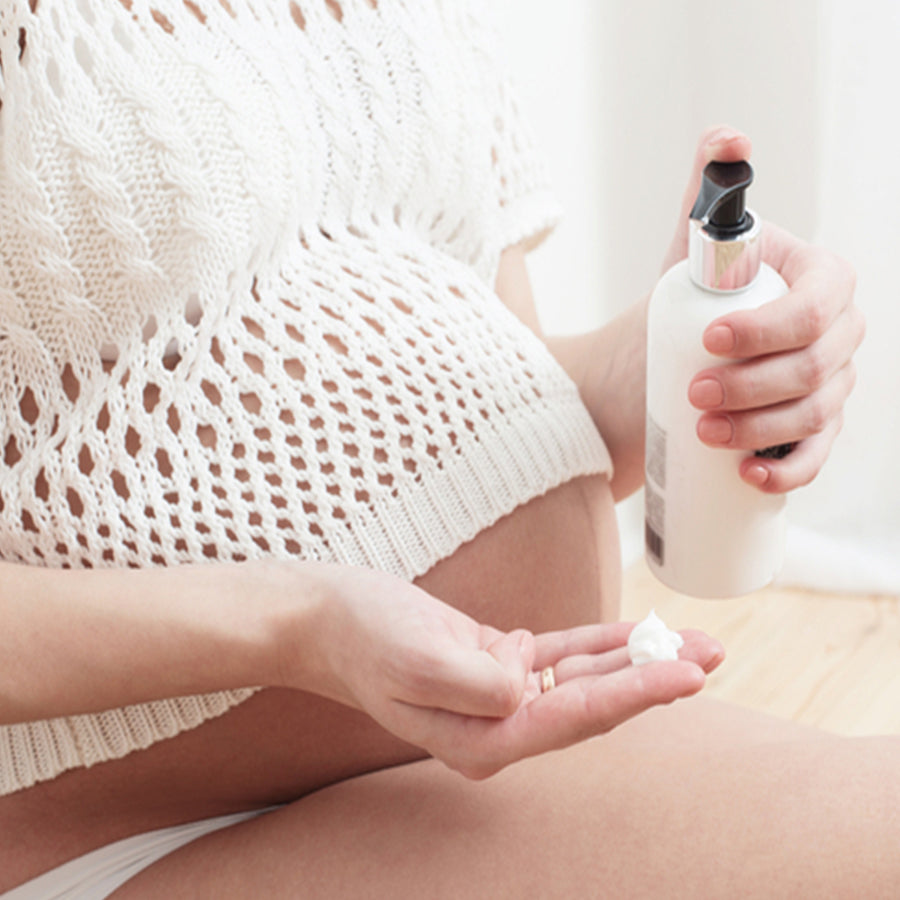Ah, pregnancy. Along with the joyous anticipation of the baby and beautiful pregnant glow come other welcome changes like thicker hair and nails. But pregnancy may also comes with a host of skincare issues. Thus, you may have to consider the specific changes you’re experiencing, take a good look at your beauty arsenal, and evaluate whether you need to remove or add beauty and skincare products to come up with the best skincare routine for pregnancy.
What to Expect, the Skin Care Edition
There are obvious bodily changes like a growing belly and breasts that are getting ready for milk production, but some women experience changes in their skin, too. Below are some of your skincare and beauty must-haves and the specific issues they address:
Moisturizing cream or oil for stretch marks
As your body rapidly changes, you may start noticing streaks on your skin. These streaks are called stretch marks and appear on your stomach in the later stages of pregnancy. They can also appear on your breasts, buttocks, and thighs. There is no way to tell if you’re going to get stretch marks but research suggests that it’s genetic, meaning if other people in your family have them, chances are you’ll have them, too.
The best way to prevent the appearance of stretch marks is to stay within a healthy weight to avoid the rapid stretching of the skin. While there is no conclusive evidence to support that skincare products can prevent stretch marks, a moisturizing cream, salve, or oil can at least keep skin from drying out, another effect of expanding skin. Shea butter or cocoa butter is a popular choice among expectant women.
1. Lotion for Itchy skin and rashes
Itchiness and rashes may come as by-products of stretching skin and the consequent dryness. They may also be effects of the hormonal changes that your body is undergoing. It’s normal to feel itchy around your belly and breasts or even all over your body.
Make sure you stay moisturized with a lotion that is free of possible irritants like fragrance. An ice pack can also help. Avoid hot showers and instead opt for cold or lukewarm ones as hot water can dry out your skin even more.
2. Water-based skincare products for acne
As your hormones are going haywire, you may experience an acne breakout, even if you’ve had clear skin all your life. (The reverse may be true for others—acne-prone women sometimes find that pregnancy clears their skin.)
Make sure to gently wash your face and don’t scrub as this can further irritate your skin. Use water-based, rather than oil-based, skincare and beauty products. Consult with your doctor first before treating acne with benzoyl peroxide or salicylic acid as some advice against these during pregnancy.
3. Sunscreen, organic skincare products, and concealer for melasma or dark spots
Hormones are also responsible for melasma or dark spots during pregnancy. It is sometimes called the mask of pregnancy as the spots often appear on the face. They can also appear on other parts of the body like the underarms and neck, as well as down the stomach as a line called linea negra. Not to worry—these dark spots aren’t there forever and disappear after pregnancy.
In the meantime, make sure you slather on some sunscreen daily and avoid sun exposure, which may aggravate the spots. You can also switch to milder products like organic skincare products to prevent irritation.
And take note: You might be tempted to reach for a brightening cream with hydroquinone, but don’t—there is evidence, albeit limited, that it may cause pregnancy complications. Just reach for concealer instead if you’re feeling conscious.
4. Compression socks or stockings for varicose veins
Varicose veins are swollen blue or purple veins that normally appear on legs. They are the result of the pressure your growing uterus puts on your inferior vena cava (a large vein), which in turn puts more pressure on your leg veins. Your leg veins thus have to work doubly hard during pregnancy. Fortunately, varicose veins tend to subside after pregnancy.
If varicose veins are giving you discomfort, try to stay off your feet, don’t cross your legs or ankles while sitting, and elevate your feet above your heart at the end of a long day. You can also try wearing compression socks or stockings to help prevent swelling.
Why Go Organic
You may not have given your beauty and skincare products much thought before, but now that they may potentially affect your baby, it’s good to re-evaluate. After all, even products applied topically can be absorbed by the skin and into the bloodstream.
Some of the ingredients you’ll want to avoid: parabens, fragrance, phthalates, triclosan, formaldehyde, toluene, and hydroquinone. Doctors also advise against retinoids so check the label of your anti-aging products for this ingredient.
Your best bet is to switch to organic beauty products so that you’re assured of safe skincare ingredients during pregnancy. Organic products can help you look even more radiant and, most importantly, can keep you and your baby safe from the potentially harmful effects of chemicals.





